A new FinCEN alert, issued in August 2025, has put the spotlight on the growing abuse of crypto ATMs in fraud and money laundering operations across the United States. According to the agency, more than $3.9 billion in suspicious transactions flowed through these kiosks between 2020 and 2024. These machines, also known as Bitcoin ATMs or CVC kiosks, are now being linked to large-scale ATM fraud.
FinCEN Alert: Why the Agency Is Sounding the Alarm
FinCEN, the U.S. Treasury’s financial crime unit, alerts on a sharp rise in illicit activity involving Convertible Virtual Currency (CVC) kiosks. These machines allow customers to deposit cash in exchange for digital assets like Bitcoin and were designed to increase access to crypto. However, the latest FinCEN warning suggests crypto ATMs have become tools for criminal exploitation and fraud.
The advisory directs banks, credit unions, and money service businesses (MSBs) to apply stricter scrutiny when servicing crypto ATM operators. This is especially critical when those operators are unaffiliated with major exchanges.
Criminal Syndicates and Scams Targeting the Vulnerable
According to FinCEN, they identified transnational crime syndicates and drug cartels increasingly using Bitcoin kiosk scams. These groups launder illicit cash through the kiosks by directing victims to deposit funds into preassigned crypto wallets.
Scams targeting elderly individuals and non-native English speakers have become widespread. Common tactics include impersonating officials, manipulating online relationships, or posing as tech support. In each case, the victim is told to withdraw cash and convert it into crypto at a local ATM.
This mix of money laundering tactics and social engineering has alarmed compliance teams across the banking industry.
>>> Read more: Cryptocurrency ATM Scams On The Rise
Crypto ATM Regulations and Red Flags Financial Institutions Must Monitor
FinCEN highlights that banking partners are not vetting crypto ATM operators thoroughly enough. The lack of cryptocurrency compliance, especially with KYC and transaction monitoring, creates a high risk of abuse.
Red flags listed in the advisory include:
- Use of third-party intermediaries
- Structuring transactions just below reporting thresholds
- Unusual clustering of ATMs with high-volume activity
The alert also urges financial institutions to examine relevant FinCEN reports for suspicious activity trends. It is important that institutions understand who owns and operates the crypto kiosks they serve.
The emergence of crypto ATM fraud as a systemic crime risk raises concerns because money laundering networks successfully exploit the fragmented oversight.
What Financial Institutions Need to Do Now
FinCEN reminds regulated institutions of their obligations under the Bank Secrecy Act. That includes implementing financial institution due diligence tailored to the risks posed by crypto kiosks. Extra scrutiny is expected for kiosk operators, particularly when business models appear opaque or inconsistent with known industry practices.
FinCEN also encourages institutions to review their suspicious activity reporting systems. This ensures that trends involving kiosk-based fraud aren’t overlooked.
A Regulatory Flashpoint for the Crypto Ecosystem
This alert is not just about kiosks. It reflects a broader concern about the weakest links in the crypto ecosystem. With billions in money laundering activity tied to these semi-anonymous crypto terminals, policymakers are likely to push for tighter crypto ATM regulations.
At the same time, enforcement pressure will rise on institutions that fail to respond. Crypto ATMs sit at the crossroads of cash and digital value. This hybrid nature challenges AML frameworks designed for one or the other—but not both.
>>> Read more: New Zealand Bans Crypto ATMs, Enforces $5K Transfer Cap
Conclusion: Crypto ATMs in the Crosshairs
The FinCEN alert marks a turning point in how regulators view crypto kiosks. These machines are no longer niche tools. They are now central to fraud schemes and money laundering operations. Institutions that look the other way could face enforcement actions, or worse, complicity in a multi-billion-dollar wave of crypto ATM fraud.
Closing compliance gaps and tightening oversight may still contain the growing risk of crypto ATM fraud before the next billion is lost.
Readers’ frequently asked questions
What kind of licenses are required to operate a crypto ATM in the U.S.?
Crypto ATM operators are typically required to register as Money Services Businesses (MSBs) with FinCEN and comply with applicable state-level money transmitter licensing laws. The exact requirements vary by state, and failure to obtain the correct licensing can result in enforcement actions.
Are financial institutions legally responsible if a kiosk operator they serve engages in fraud?
While financial institutions are not automatically liable for a client’s misconduct, they may face regulatory penalties if they fail to conduct proper due diligence or ignore red flags. Under the Bank Secrecy Act, institutions must monitor for suspicious activity and file SARs when necessary.
Can victims of crypto ATM scams recover their funds?
In most cases, funds sent through crypto ATMs are not recoverable due to the irreversible nature of blockchain transactions. Victims should report incidents immediately to local law enforcement, the FBI’s Internet Crime Complaint Center (IC3), and the ATM operator if possible.
What Is In It For You? Action items you might want to consider
Review your institution’s exposure to crypto ATM operators
If you work in banking, compliance, or fintech, audit your customer base for any links to independent crypto ATM networks. Reassess risk models and customer due diligence frameworks, especially for kiosk operators not affiliated with licensed exchanges.
Understand your local state’s crypto ATM laws
Crypto ATM regulations in the U.S. vary widely by state. Lawyers, policy analysts, and fintech founders should track state-level licensing and reporting requirements to identify potential enforcement gaps or business opportunities.
Warn customers about common scam tactics
Financial advisors, ATM operators, and community banks should proactively inform customers, especially elderly or non-English speakers, about red flags, e.g., government impersonation or romantic fraud, asking them to withdraw cash and use crypto kiosks.










